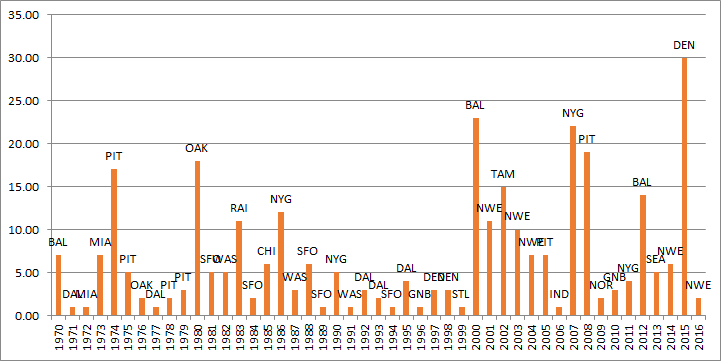WARNING: unbalanced footnote start tag short code found.
If this warning is irrelevant, please disable the syntax validation feature in the dashboard under General settings > Footnote start and end short codes > Check for balanced shortcodes.
Unbalanced start tag short code found before:
“when Gary Clark, Ricky Sanders, and Art Monk helped the Redskins finish with the third-most efficient passing offense) or 1997 (when Elway’s Broncos ranked 3rd in ANY/A and won the Super Bowl). Although maybe don’t ask them about 2007. And if you have other thoughts on how to measu…”
If you’re short on time, let me save you a read: no.
And now for the long answer.
The graph below shows where each Super Bowl champion since the AFL/NFL merger ranked in Adjusted Net Yards per Attempt:
Of the last 10 Super Bowl champions, four of them ranked 14th or lower in ANY/A. That matches the number of champions in the previous 41 Super Bowls combined. The only teams to win a Super Bowl prior to 2007 with a passing attack that ranked 14th or lower in ANY/A were the ’74 Steelers (during the early days of the Terry Bradshaw era), the 1980 Raiders (Jim Plunkett was not good until the playoffs), and two teams that like the 2015 Broncos had dominant postseason runs on defense, the 2000 Ravens (also sporting a historically great defense during the regular season) and 2002 Bucs (with perhaps the best pass defense ever). The fact that it’s happened four times since then is evidence that having a great quarterback (or passing game) is less important than ever, even if last year pitted the top two quarterbacks in the Super Bowl. ((Of course, the fact that is also happened in 1966, 1971, and 1984 cuts against the idea that the passing game is more important now than ever, too.))
Yes, “Peyton Manning” was the quarterback of the 2015 Broncos, but he was no more Peyton Manning than Terry Bradshaw was Terry Bradshaw during the ’74 Steelers run. That same Peyton Manning struggled mightily in the playoffs the year before and in that regular season, and wasn’t even particularly good in the postseason: Denver rode a great defense to the championship.
The same generally goes for 2008 Ben Roethlisberger, who had the second-worst season of his career that year. He played well (but not notably well, and still below average for a Super Bowl winning passer) in the playoffs, but that doesn’t change the fact that he was not good during the regular season.
And while yes, Eli Manning and the Giants have won two Super Bowls, that also doesn’t change the fact that he led the NFL in interceptions in 2007 and played poorly for large stretches during the season. And we all recall what happened with Joe Flacco, and how his scorched earth performance in the 2012 playoffs stands as a severe outlier compared to the rest of his career.
When analysts say that you need a great quarterback (or a great passing game) to win it all, that’s simply not true unless they are using the phrase in a big tent sort of way: if a mediocre quarterback who plays well for four games qualifies as a great quarterback, then yes, you probably do need a great quarterback to win (except for, you know, the 2015 Broncos). But in general, far too much deference is given to the phrase “you need a great quarterback to win.”
Two years ago, a survey of ESPN insiders ranked Matt Ryan as the 11th best QB in the NFL; last year, he ranked 13th in the same study. Would anyone have labeled Ryan as a QB on the verge of producing one of the best seasons in NFL history this time a year ago?
Passing has always been important. Otto Graham reached the title game in 10 straight seasons in large part because he was one of the greatest quarterbacks in NFL history. Bart Starr, Joe Namath, and Len Dawson won the first four Super Bowls. Terry Bradshaw and Roger Staubach each made four Super Bowls in the ’70s. Joe Montana did that in the ’80s. Hall of Fame passers won eight straight Super Bowls in the ’90s, starting in ’92: Troy Aikman, Aikman, Steve Young, Aikman, Brett Favre, John Elway, Elway, and Kurt Warner. Having a great passing game has always been important, but it’s not more important now than ever.
Want more proof that passing isn’t more important now than ever? The graph below shows the average winning percentage of the bottom 5 teams in ANY/A for each year since the merger. As you can see, there isn’t a sharp decline — which would indicate that passing efficiency is more important than ever — but rather a chart with a bunch of year-to-year variance with a average of about 0.310.

Next time you here the claim that passing is more important than ever, you should probably ignore their comment. Or, if you like being confrontational, ask them what makes passing more important in 2017 than in 1977 (when Roger Staubach and the Cowboys had the number one passing offense in the NFL and won the Super Bowl) or 1987 ((when Gary Clark, Ricky Sanders, and Art Monk helped the Redskins finish with the third-most efficient passing offense) or 1997 (when Elway’s Broncos ranked 3rd in ANY/A and won the Super Bowl). Although maybe don’t ask them about 2007.
And if you have other thoughts on how to measure whether passing is more important now than ever before, leave them in the comments.

